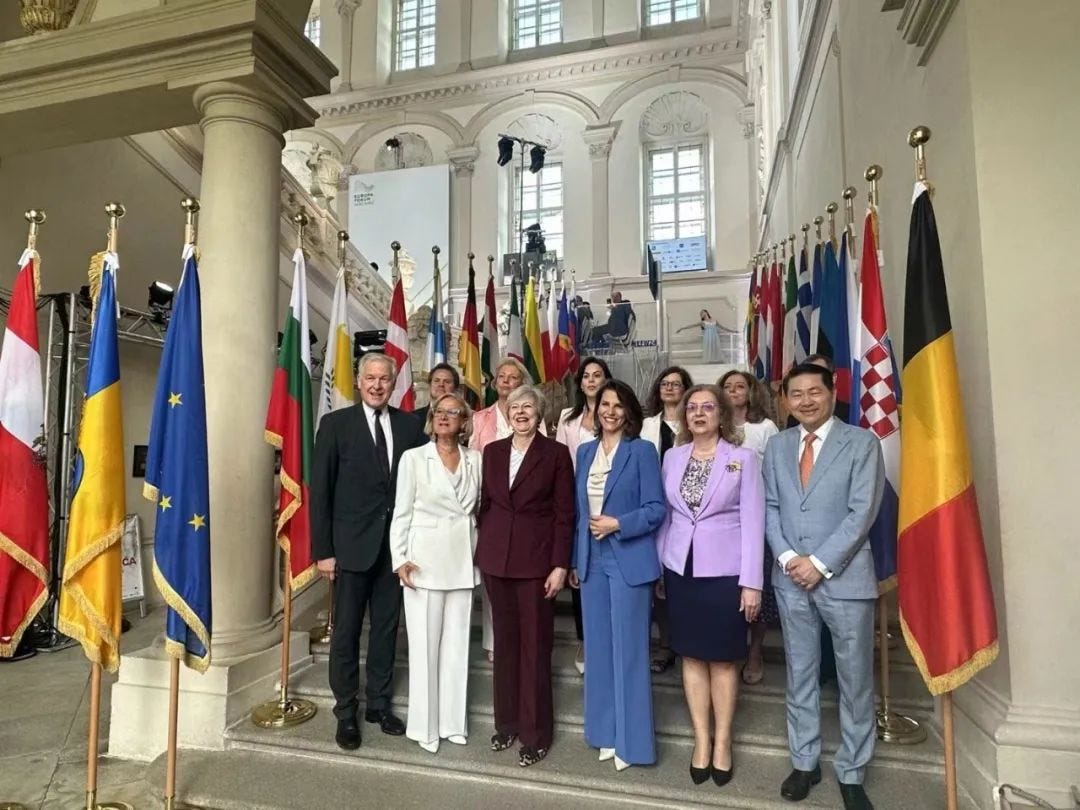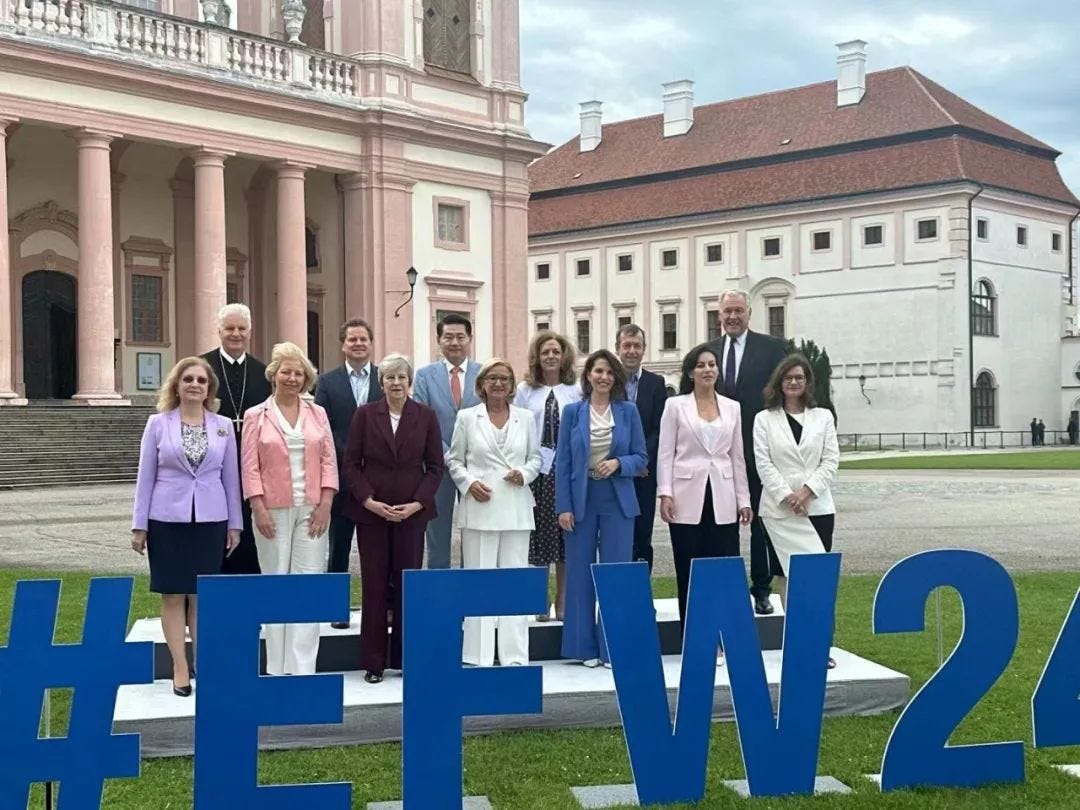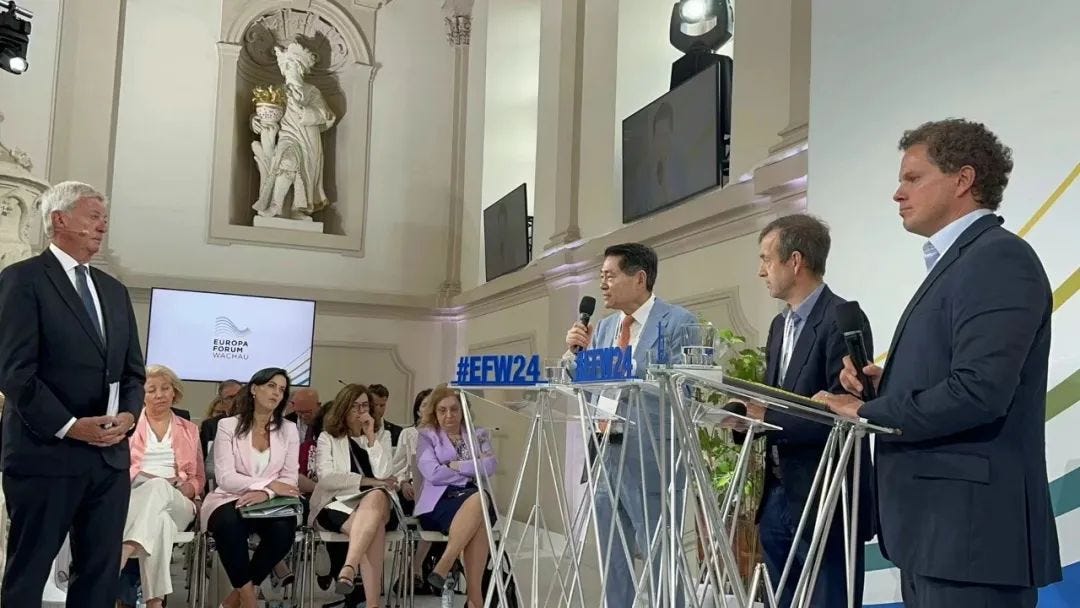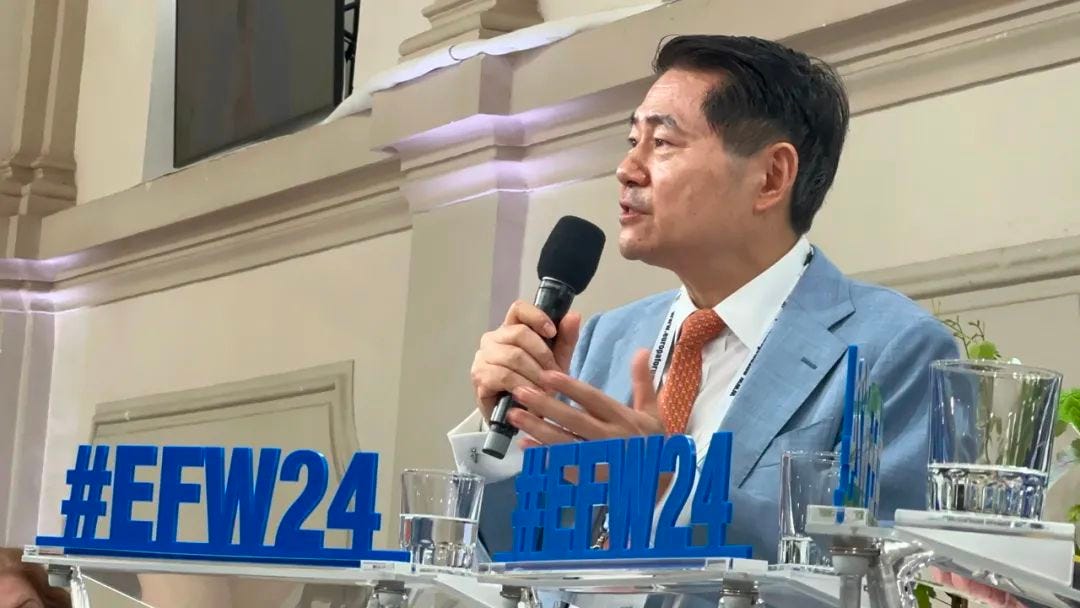Henry Huiyao Wang's contribution to the Wachau European Forum 2024
On June 22, CCG president joined global panel discussing "Europe between Sino-American Relations."
The 28th Wachau European Forum 2024 took place from June 20 to 22 2024 at Göttweig Abbey and Campus Krems under the theme "Rebooting Europe." The event featured prominent speakers including Austrian Chancellor Karl Nehammer, former British Prime Minister Theresa May, EU High Representative of the Union for Foreign Affairs Josep Borrell, and the Chinese Ambassador to Austria Qi Mei.
On June 22, Henry Huiyao Wang, President of the Center for China and Globalization (CCG), participated in a global panel discussing "Europe between Sino-American Relations" at Göttweig Abbey. The video recording remains available on the official website of the Wachau European Forum.
The panel was moderated by Austrian television journalist Roland Adrowitzer. Other panelists were:
Daniel Gros, Director of the Institute for European Policymaking at Bocconi University, Germany
David O. Shullman, Senior Director at the Global China Hub, USA
Here is the full transcript of Henry Huiyao Wang's contribution to the panel, including his interaction with the moderator. Please note that this transcript is based on a recording and may contain errors.
Moderator
China is blamed for playing unfairly on the international stage, subsidizing especially its electric car industry, the solar panel industry. The German Vice Chancellor Robert Habeck is, since yesterday, in Beijing to try to soften the trade war that's already starting to be on its way. Are we already in a trade war?
Henry Huiyao Wang
Thank you for the question. Also, thank the organizer for inviting me. It's really great for all to be here. It's such a beautiful place.
Regarding your question on the recent trade dispute and trade tariffs, I think we have to be careful on that because the world is far from overcapacity in terms of fighting climate change. According to the International Atomic Energy Agency figures, if we want to follow the Paris Climate Agreement, we probably need 820 gigawatts a year of green power and we need to spend 4.5 trillion U.S. dollars to combat climate change. And now, we only operate a quarter of it and less than 30% of that (amount) has been spent. So it's far from oversupply.
On the other hand, I think we have to be extremely careful because remember in 2017 when President Trump started the tariffs and trade war, that really disrupted the world trade picture and also disrupted the China-U.S. Relations. And since then, it has been deteriorating. So I don't want to see a trade war happening between China and the EU because the EU is one of the largest trading partners of China and vice versa. So I think it's important that we maintain openness, global trade, and free trade.
Also, we need to find a better way to solve our problem. Of course, we have a dispute, we have a problem, but going to tariffs and trade war is not the way together. We need to talk and find a way. Let's reactivate the China-EU investment treaties, for example. Let's have more Chinese investment coming to Europe, factories, employment, and also the local economy. There are many ways to solve that. I don't think the tariff is the right way.
Henry Huiyao Wang
The tariffs that the EU puts on China are actually hurting many European companies. Tesla exports half of its EV cars made in China. The EV cars exported by Chinese companies are less than 50%. The majority of them are actually made by Western multinationals. The reason for that is that if you want to develop the latest model and the state-of-the-art EV cars in the world today, the only place is in China, which has the largest consumer market, all the application scenes, and all the things.
So this is not the right way. Where we are is totally different from the picture 20 or 30 years ago. I disagree because I think we're in a more multipolar world and we have a variety of different systems in the world. You can't say it's autocracy versus democracy and the binary view of the world.
I think Europe is really in a good position because it has a very long history, an expanded culture, and everything. That echoes with Chinese as well. I think the EU can really be a great power between China and the US, mediate China and the US, and help this relationship. So I don't think the EU should follow completely what the US does in terms of China policy. If the US says China is a strategic rival, the EU will say it is a systemic rival. We don't have to say that. I mean, if you really want to put China into rivalry, it could become a self-fulfilling prophecy and China would become a rival. That's not good for the world.
So I think we should work together. The EU and China can safeguard multilateralism, the WTO, and world trade. I think China, the EU, and the US can work together for human security. We emphasize too much on national security, but people forget about climate security, food security, energy security, and the Global South. So we really need to work on that, have a big power responsibility, and work together for the sake of mankind.
Henry Huiyao Wang
I was at the Munich Security Conference this year. We always organize side events there on China-US-EU collaboration on climate. I heard that the German Council on Foreign Relations head said that if China can produce solar power much more cheaply and efficiently, that's a benefit to the world. We're talking about lacking funding for developing countries fighting climate change. If China can produce more cheaply, that's a blessing for the world.
The US and Europe can produce Airbus and Boeing. There's never an overcapacity issue. China buys 90% of its aircraft (from them) in the Chinese air market. So it's not just because something is made in China that we are going to say it's an overcapacity or it's flooding the world. It's not the right thing.
On the other hand, David mentioned there are things like Australia and other countries' relations with China weren't good, but that was during COVID. I mean, China's Premier Li Qiang was just in Australia and had a lot of good discussions. They are restarting the service trade talks now. I think they have really put their relations back on track.
What I see is actually, the world is in a dangerous place now. We're talking too much about over-securitization going on. I think we really need the top countries to work together to stop, for example, the Russian invasion of Ukraine and things like that. But let's work together on that rather than put China as the rival number one.
Of course, you have the Five Eyes, you have NATO wanting to move its office to Tokyo, and you have also AUKUS, you have QUAD, you have Camp David, you have all those military alliances set up by the US around China, which is really very bad, I think. It's not helpful.
But then what China does is all these economic organizations. China launched the AIIB and the UK is a big supporter of that, with other European countries. Also the Belt and Road, and then RCEP. China wants to join the CPTPP designed by the United States. All those economic trade liberalizations. I think China also has a lot of regional initiatives, like China-Africa, China-Latin America, China-ASEAN, and China-BRICS. So all the countries are looking for economic expansion, globalization, and prosperity. That's where the attractiveness is. That's why there are 30 countries lined up who want to join BRICS. The Turkish Foreign Minister was in my office just two weeks ago and Turkey wants to join BRICS.
Moderator
Russia is now highly dependent on China. Why doesn't China try to stop this war?
Henry Huiyao Wang
Well, actually, China is trying. I remember I wrote an op-ed in the New York Times two weeks after the war broke out, suggesting China should intervene and help. That's exactly what China did. 12 months later, China published this 12-point peace proposal.
I think it's very important when Olaf Scholz came to Beijing, President Xi said no nuclear war should be fought in Ukraine. And that's a strong message. If Russia cannot fight a nuclear war, what power does it have? When President Macron came to Beijing, President Xi called Zelensky next two days after his visit. So I think China’s doing all its best. Also, China now has a 6-point proposal with Brazil. Countries like Turkey, South Africa, and even India, there are 40 countries that want to go along with this kind of proposal.
The thing is, China of course wants to support peace talks, but like the peace talk we're having in Switzerland without the fighting parties...
Moderator
China wants to broker peace talks in its own way.
Henry Huiyao Wang
Yes. If you really want peace talks, you need the fighting parties on the table. Of course, we had a rally that condemned it. We already had that in the UN; we don’t need another condemnation.
China, of course, strongly supports Ukraine's sovereignty and territorial integrity, but I don't think China is going to 100% position with NATO and the EU. China (needs to) save a little face to mediate in the end so that they can talk to both sides rather than become totally a confronting party of the other side. So that's why I think the little neutrality China maintains there is good for solving this problem in the end. And in the end, you'll see probably China and the Global South—Turkey and Brazil—will be the major parties to solve this crisis.
Moderator
We haven't spoken about Taiwan yet, but will it change something for Taiwan if Mr. Trump returns?
Henry Huiyao Wang
Well, I think that it looks like there's already a bipartisan consensus in the US vis-a-vis China, but what I have been seeing is that, for example, there are 1,600 Chinese companies on the American Entity or sanction list. There are only a few American companies on China('s list). So you can see the difference. China still welcomes American companies.
The other thing is that in the Trump era, he frequently engaged China to have trade talks, more substantial talks. Every few months, there is a high-level vis-a-vis and they engage in negotiations. Whereas, in the first two and a half years of the Biden administration, we haven't seen anything but Nancy Pelosi's visit to Taiwan and the balloon incident. It's only until recently at the San Francisco Summit that we see high-level movement.
I think Biden would probably continue this rally around allies to encircle China. I don't think that is really a good approach. But for President Trump, probably he would engage again in trade talks. He could pursue Phase Two, Phase Three. If we could have regular talks, that would be great. China loves to talk and really get things solved at the table. It took 16 years for China to talk into the WTO. China made huge changes from that.
So I think, by going to China, which has now opened visa-free (access) for 12 countries in Europe, it's a great thing. There's a lot of hype outside China. By going into China, you will really see a lot of misconceptions. Recently, China gave Australia and New Zealand visa-free access. I hope China can give the US or Japan visa-free access to visit so that the more people come to visit China, the less fear you are gonna have, the more objective attitudes you will have, and the better future we will have rather than just one-sided.







